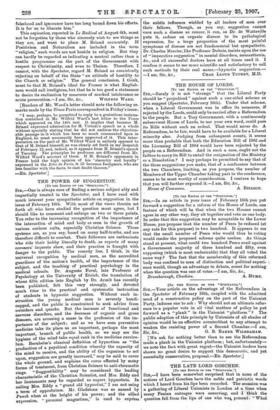THE HOUSE OF LORDS.
[To THE EDITOR or THE "SPECTATOR..] SIR,—Surely it is not " strange " that the Liberal Party should be " prejudiced " against such a one-sided scheme as you suggest (Spectator, February 16th). Under that scheme, when a Liberal Government was in office its measures, if rejected by the Lords, could only be carried after a Referendum to the people. But a Tory Government, with a continuously subservient House of Lords, to use your own word, could pass its Bills without such an ordeal. That would never do. A Referendum, to be fair, would have to be available for a Liberal minority also. Judging from subsequent events, it seems more than probable that both the Education Bill of 1902 and the Licensing Bill of 1904 would bare been rejected by the people on a Referendum. And in such a case, Ought not the failure to carry its Bill to entail the resignation of the Ministry or a Dissolution P I may perhaps be permitted to say that of the three suggestions you make, that of a conference between the two Chambers, limiting, as you propose, the number of Members of the Upper Chamber taking part in the conference, seems to be most worthy of consideration. I venture to hope that you will further expound it.—I am, Sir, &c.,










































 Previous page
Previous page